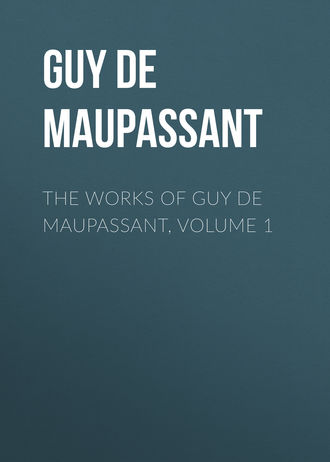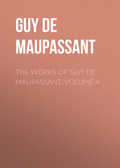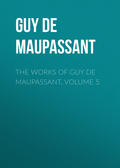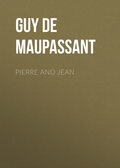
Ги де Мопассан
The Works of Guy de Maupassant, Volume 1
HOW HE GOT THE LEGIONOF HONOR
Some people are born with a predominant instinct, with some vocation or some desire which has been evoked as soon as they begin to speak or to think.
Ever since he was a child M. Caillard had only had one idea in his head – to be decorated. When he was still quite a small boy he used to wear a zinc Cross of the Legion of Honor in his tunic, just like other children wear a soldier's cap, and he took his mother's hand in the street with a proud look, sticking out his little chest with its red ribbon and metal star so that it might show to advantage.
His studies were not a success, and he failed in his Examination for Bachelor of Arts; so, not knowing what to do, he married a pretty girl, as he had plenty of money of his own.
They lived in Paris, like many rich middle-class people do, mixing with their own particular set, without going among other people, and proud of knowing a Deputy, who might perhaps be a Minister some day, while two Chiefs of Division were among their friends.
But Mons. Caillard could not get rid of his one absorbing idea, and he felt constantly unhappy because he had not the right to wear a little bit of colored ribbon in his buttonhole.
When he met any men who were decorated, on the boulevards, he looked at them askance, with intense jealousy. Sometimes, when he had nothing to do in the afternoon, he would count them, and say to himself: "Just let me see how many I shall meet between the Madeleine and the Rue Druot."
Then he would walk slowly, looking at every coat with a practiced eye for the little bit of red ribbon, and when he had got to the end of his walk he always said the numbers out aloud. "Eight officers and seventeen knights. As many as that! It is stupid to sow the Cross broadcast in that fashion. I wonder how many I shall meet going back?"
And he returned slowly, unhappy when the crowd of passers-by interfered with his seeing them.
He knew the places where most were to be found. They swarmed in the Palais Royal. Fewer were seen in the Avenue de l'Opera than in the Rue de la Paix, while the right side of the boulevard was more frequented by them than the left.
They also seemed to prefer certain cafés and theaters. Whenever he saw a group of white-haired old gentlemen standing together in the middle of the pavement, interfering with the traffic, he used to say to himself: "They are officers of the Legion of Honor," and he felt inclined to take off his hat to them.
He had often remarked that the officers had a different bearing to the mere knights. They carried their head differently, and one felt that they enjoyed a higher official consideration, and a more widely-extended importance.
Sometimes again the worthy man would be seized with a furious hatred for everyone who was decorated; he felt like a Socialist towards them.
Then, when he got home, excited at meeting so many Crosses – just like a poor hungry wretch is on passing some dainty provision shop – he used to ask in a loud voice:
"When shall we get rid of this wretched Government?" And his wife would be surprised, and ask:
"What is the matter with you to-day?"
"I am indignant," he replied, "at the injustice I see going on around us. Oh! the Communards were certainly right!"
After dinner he would go out again and look at the shops where all the decorations were sold, and he examined all the emblems of various shapes and colors. He would have liked to possess them all, and to have walked gravely at the head of a procession with his crush-hat under his arm and his breast covered with decorations, radiant as a star, amid a buzz of admiring whispers and a hum of respect.
But, alas! he had no right to wear any decoration whatever.
He used to say to himself: "It is really too difficult for any man to obtain the Legion of Honor unless he is some public functionary. Suppose I try to get appointed an officer of the Academy!"
But he did not know how to set about it, and spoke to his wife on the subject, who was stupefied.
"Officer of the Academy! What have you done to deserve it?"
He got angry. "I know what I am talking about; I only want to know how to set about it. You are quite stupid at times."
She smiled. "You are quite right; I don't understand anything about it."
An idea struck him: "Suppose you were to speak to M. Rosselin, the Deputy, he might be able to advise me. You understand I cannot broach the subject to him directly. It is rather difficult and delicate, but coming from you it might seem quite natural."
Mme. Caillard did what he asked her, and M. Rosselin promised to speak to the Minister about it, and then Caillard began to worry him, till the Deputy told him he must make a formal application and put forward his claims.
"What were his claims?" he said. "He was not even a Bachelor of Arts."
However, he set to work and produced a pamphlet, with the title, "The People's Right to Instruction," but he could not finish it for want of ideas.
He sought for easier subjects, and began several in succession. The first was, "The Instruction of Children by means of the Eye." He wanted gratuitous theaters to be established in every poor quarter of Paris for little children. Their parents were to take them there when they were quite young, and, by means of a magic-lantern, all the notions of human knowledge were to be imparted to them. There were to be regular courses. The sight would educate the mind, while the pictures would remain impressed on the brain, and thus science would, so to say, be made visible. What could be more simple than to teach universal history, natural history, geography, botany, zoology, anatomy, &c., &c., thus?
He had his ideas printed in tract form, and sent a copy to each Deputy, ten to each Minister, fifty to the President of the Republic, ten to each Parisian and five to each provincial newspaper.
Then he wrote on "Street Lending-Libraries." His idea was to have little carts full of books drawn about the streets, like orange-carts are. Every householder or lodger would have a right to ten volumes a month by means of a halfpenny subscription.
"The people," M. Caillard said, "will only disturb itself for the sake of its pleasures, and since it will not go to instruction, instruction must come to it," &c., &c.
His essays attracted no attention, but he sent in his application, and he got the usual formal official reply. He thought himself sure of success, but nothing came of it.
Then he made up his mind to apply personally. He begged for an interview with the Minister of Public Instruction, and he was received by a young subordinate, who already was very grave and important, and who kept touching the knobs of electric-bells to summon ushers, and footmen, and officials inferior to himself. He declared to M. Caillard that his matter was going on quite favorably, and advised him to continue his remarkable labors, and M. Caillard set at it again.
M. Rosselin, the Deputy, seemed now to take a great interest in his success, and gave him a lot of excellent, practical advice. He was decorated, although nobody knew exactly what he had done to deserve such a distinction.
He told Caillard what new studies he ought to undertake; he introduced him to learned Societies which took up particularly obscure points of science, in the hope of gaining credit and honors thereby; and he even took him under his wing at the Ministry.
One day, when he came to lunch with his friend (for several months past he had constantly taken his meals there), he said to him in a whisper as he shook hands: "I have just obtained a great favor for you. The Committee of Historical Works is going to intrust you with a commission. There are some researches to be made in various libraries in France."
Caillard was so delighted that he could scarcely eat or drink, and a week later he set out. He went from town to town, studying catalogues, rummaging in lofts full of dusty volumes, and was hated by all the librarians.
One day, happening to be at Rouen, he thought he should like to go and embrace his wife, whom he had not seen for more than a week, so he took the nine o'clock train, which would land him at home by twelve at night.
He had his latchkey, so he went in without making any noise, delighted at the idea of the surprise he was going to give her. She had locked herself in. How tiresome! However, he cried out through the door:
"Jeanne, it is I."
She must have been very frightened, for he heard her jump out of bed and speak to herself, as if she were in a dream. Then she went to her dressing-room, opened and closed the door, and went quickly up and down her room barefoot two or three times, shaking the furniture till the vases and glasses sounded. Then at last she asked:
"Is it you, Alexander?"
"Yes, yes," he replied; "make haste and open the door."
As soon as she had done so, she threw herself into his arms, exclaiming:
"Oh! what a fright!.. What a surprise!.. What a pleasure!.."
He began to undress himself methodically, like he did everything, and from a chair he took his overcoat, which he was in the habit of hanging up in the hall. But, suddenly, he remained motionless, struck dumb with astonishment – there was a red ribbon in the buttonhole!
"Why," he stammered, "this – this – this – this overcoat has got the rosette in it!"
In a second his wife threw herself on him, and taking it from his hands, she said:
"No! you have made a mistake – give it to me."
But he still held it by one of the sleeves, without letting it go, repeating, in a half-dazed manner:
"Oh! Why? Just explain … whose overcoat is it? It is not mine, as it has the Legion of Honor on it."
She tried to take it from him, terrified, and hardly able to say:
"Listen … listen … give it me … I must not tell you … it is a secret … listen to me."
But he grew angry, and turned pale:
"I want to know how this overcoat comes to be here? It does not belong to me."
Then she almost screamed at him:
"Yes it does; listen … swear to me … well … you are decorated."
She did not intend to joke at his expense.
He was so overcome that he let the overcoat fall, and dropped into an armchair.
"I am … you say I am … decorated?"
"Yes, but it is a secret, a great secret."
She had put the glorious garment into a cupboard, and came to her husband pale and trembling.
"Yes," she continued, "it is a new overcoat that I have had made for you. But I swore that I would not tell you anything about it, as it will not be officially announced for a month or six weeks, and you were not to have known till your return from your business journey. M. Rosselin managed it for you."
"Rosselin!" he contrived to utter in his joy; "he has obtained the decoration for me? He – Oh!"
And he was obliged to drink a glass of water.
A little piece of white paper fell to the floor out of the pocket of the overcoat. Caillard picked it up; it was a visiting-card, and he read out:
"Rosselin – Deputy."
"You see how it is," said his wife.
He almost cried with joy, and, a week later, it was announced in the Journal Officiel that M. Caillard had been awarded the Legion of Honor on account of his exceptional services.
THE ACCURSED BREAD
Daddy Taille had three daughters: Anna, the eldest, who was scarcely ever mentioned in the family; Rose, the second girl, who was eighteen; and Clara, the youngest, who was a girl of fifteen.
Old Taille was a widower, and a foreman in M. Lebrument's button-manufactory. He was a very upright man, very well thought of, abstemious; in fact a sort of model workman. He lived at Havre, in the Rue d'Angoulême.
When Anna ran away the old man flew into a fearful rage. He threatened to kill the seducer, who was head clerk in a large draper's establishment in that town. Then, when he was told by various people that she was keeping very steady and investing money in Government securities, that she was no gadabout, but was kept by a Mons. Dubois, who was a judge of the Tribunal of Commerce, the father was appeased.
He even showed some anxiety as to how she was getting on, asked some of her old friends who had been to see her how she was getting on; and when told that she had her own furniture, and that her mantelpiece was covered with vases and the walls with pictures, that there were clocks and carpets everywhere, he gave a broad, contented smile. He had been working for thirty years to get together a wretched five or six thousand francs. This girl was evidently no fool.
One fine morning the son of Touchard, the cooper, at the other end of the street, came and asked him for the hand of Rose, the second girl. The old man's heart began to beat, for the Touchards were rich and in a good position. He was decidedly lucky with his girls.
The marriage was agreed upon, and it was settled that it should be a grand affair, and the wedding dinner was to be held at Sainte-Adresse, at Mother Lusa's restaurant. It would cost a lot certainly; but never mind, it did not matter just for once in a way.
But one morning, just as the old man was going home to breakfast with his two daughters the door opened suddenly, and Anna appeared. She was elegantly dressed, wore rings and an expensive bonnet, and looked undeniably pretty and nice. She threw her arms round her father's neck before he could say a word, then fell into her sister's arms with many tears, and then asked for a plate, so that she might share the family soup. Taille was moved to tears in his turn and said several times:
"That is right, dear; that is right."
Then she told them about herself. She did not wish Rose's wedding to take place at Sainte-Adresse, – certainly not. It should take place at her house, and would cost her father nothing. She had settled everything and arranged everything, so it was "no good to say any more about it, – there!"
"Very well, my dear! very well!" the old man said, "we will leave it so." But then he felt some doubt. Would the Touchards consent? But Rose, the bride-elect, was surprised and asked, "Why should they object, I should like to know? Just leave that to me, I will talk to Philip about it."
She mentioned it to her lover the very same day, and he declared that it would suit him exactly. Father and Mother Touchard were naturally delighted at the idea of a good dinner which would cost them nothing, and said:
"You may be quite sure that everything will be in first-rate style, as M. Dubois is made of money."
They asked to be allowed to bring a friend, Mme. Florence, the cook on the first floor, and Anna agreed to everything.
The wedding was fixed for the last Tuesday of the month.
II
After the civil formalities and the religious ceremony the wedding party went to Anna's house. Among those whom the Tailles had brought was a cousin of a certain age, a M. Sauvetanin, a man given to philosophical reflections, serious, and always very self-possessed, and Mme. Lamonoois, an old aunt.
M. Sauvetanin had been told off to give Anna his arm, as they were looked upon as the two most important persons in the company.
As soon as they had arrived at the door of Anna's house she let go her companion's arm, and ran on ahead, saying, "I will show you the way," and ran upstairs while the invited guests followed more slowly; and, when they got upstairs, she stood on one side to let them pass, and they rolled their eyes and turned their heads in all directions to admire this mysterious and luxurious dwelling.
The table was laid in the drawing-room as the dining-room had been thought too small. Extra knives, forks, and spoons had been hired from a neighboring restaurant, and decanters full of wine under the rays of the sun which shown in through the window.
The ladies went into the bedroom to take off their shawls and bonnets, and Father Touchard, who was standing at the door, squinted at the low wide bed, and made funny and suggestive signs to the men, with many a wink and a nod. Daddy Taille, who thought a great deal of himself, looked with fatherly pride at his child's well-furnished rooms, and went from one to the other holding his hat in his hand, making a mental inventory of everything, and walking like a verger in a church.
Anna went backwards and forwards, ran about giving orders and hurrying on the wedding feast. Soon she appeared at the door of the dining-room, and cried: "Come here, all of you, for a moment," and when the twelve guests did as they were asked they saw twelve glasses of Madeira on a small table.
Rose and her husband had their arms round each other's waists, and were kissing each other in every corner. Mons. Sauvetanin never took his eyes off Anna; he no doubt felt that ardor, that sort of expectation which all men, even if they are old and ugly, feel for women of a certain stamp, as if they owed a little of themselves, professionally, to all males.
They sat down, and the wedding-breakfast began; the relations sitting at one end of the table and the young people at the other. Mme. Touchard, the mother, presided on the right and the bride on the left. Anna looked after everybody, saw that the glasses were kept filled and the plates well supplied. The guests evidently felt a certain respectful embarrassment at the sight of all the sumptuousness of the rooms and at the lavish manner in which they were treated. They all ate heartily of the good things provided, but there were no jokes such as are prevalent at weddings of that sort; it was all too grand, and it made them feel uncomfortable. Old Madame Touchard, who was fond of a bit of fun, tried to enliven matters a little, and at the beginning of the dessert she exclaimed: "I say, Philip, do sing us something." The neighbors in their street considered that he had the finest voice in all Havre.
The bridegroom got up, smiled, and turning to his sister-in-law, from politeness and gallantry, tried to think of something suitable for the occasion, something serious and correct, to harmonize with the seriousness of the repast.
Anna had a satisfied look on her face, and leaned back in her chair to listen, and all assumed looks of attention, though prepared to smile should smiles be called for.
The singer announced, "The Accursed Bread," and extending his right arm, which made his coat ruck up into his neck, he began.
It was decidedly long, three verses of eight lines each, with the last line and the last line but one repeated twice.
All went well for the first two verses; they were the usual commonplaces about bread gained by honest labor and by dishonesty. The aunt and the bride wept outright. The cook, who was present, at the end of the first verse looked at a roll which she held in her hand with running eyes, as if they applied to her, while all applauded vigorously. At the end of the second verse the two servants, who were standing with their backs to the wall, joined loudly in the chorus, and the aunt and the bride wept outright. Daddy Taille blew his nose with the noise of a trombone, and old Touchard brandished a whole loaf half over the table, and the cook shed silent tears on the crust which she was still holding.
Amidst the general emotion M. Sauvetanin said:
"That is the right sort of song; very different to the nasty, risky things one generally hears at weddings."
Anna, who was visibly affected, kissed her hand to her sister, and pointed to her husband with an affectionate nod, as if to congratulate her.
Intoxicated by his success, the young man continued, and unfortunately the last verse contained the words about the bread of dishonor gained by young girls who had been led astray from the paths of virtue. No one took up the refrain about this bread, supposed to be eaten with tears, except old Touchard and the two servants. Anna had grown deadly pale, and cast down her eyes, while the bridegroom looked from one to the other without understanding the reason for this sudden coldness, and the cook hastily dropped the crust as if it were poisoned.
Mons. Sauvetanin said solemnly, in order to save the situation: "That last couplet is not at all necessary;" and Daddy Taille, who had got red up to the ears, looked round the table fiercely.
Then Anna, with her eyes swimming in tears, told the servants, in the faltering voice of a woman trying to stifle her sobs, to bring the champagne.
All the guests were suddenly seized with exuberant joy, and all their faces became radiant again. And when old Touchard, who had seen, felt, and understood nothing of what was going on, and, pointing to the guests so as to emphasize his words, sang the last words of the refrain:
"Children, I warn you all to eat not of that bread," the whole company, when they saw the champagne bottles, with their necks covered with gold foil appear, burst out singing, as if electrified by the sight:
"Children, I warn you all to eat not of that bread."






